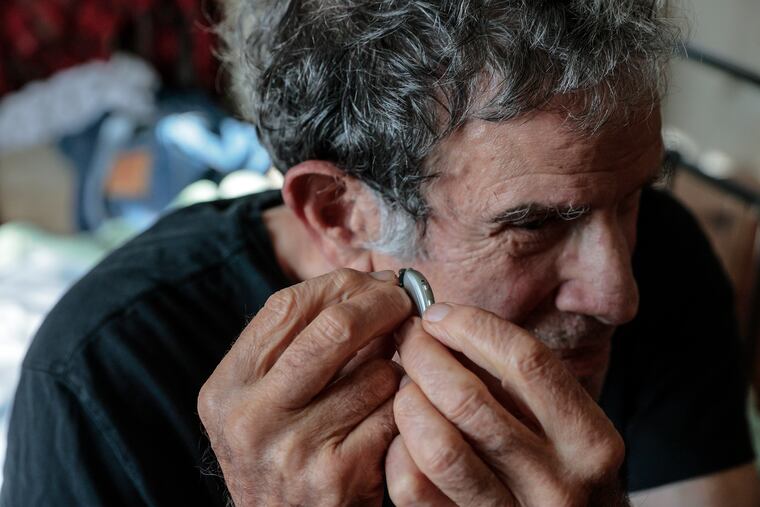The FDA approved over-the-counter hearing aids. The hardest part is wearing them consistently.
In a culture worships at the altar of youth and vitality, is it any wonder that people with hearing loss are hesitant to admit it?

On Tuesday, the Food and Drug Administration decided to let consumers buy hearing aids over the counter without a prescription. My first question was, “Will they come with coupons for counseling?”
As most geriatrics will tell you, getting hearing aids that are affordable and functional is, at most, half the battle. The hardest part is wearing them consistently. Most brands are ineffective when kept in their case.
I’ve had mine for a couple of years now — I’m 81 — and I still leave them behind so often that I have a “hearing aids” reminder sign on my apartment door, strategically located below the peephole.
The resistance to wearing hearing aids is hardly new. We’ve all got our amusing stories about hearing aids, or the lack thereof.
I recently quoted a late cousin who refused to get hearing aids because: “I’m 96 years old and I’ve heard enough.” I fondly remember shouting at him from a foot away. Now that was really special.
» READ MORE: Hearing aids will now be available without a hearing test. Here’s what to know about the new rule.
My late mother, who dreaded using any mechanical device more complicated than a can opener, would never have considered hearing aids, despite the fact that she was profoundly deaf in one ear.
Mom usually slept sunny side up, but she forgot one night, sending my sister on a frantic race across town when she couldn’t rouse Mom by stimulating a vital organ — the telephone— because she was sleeping on her side, covering her one good ear.
Someone I know used the issue to drive home a point when giving the “pot lecture” to his invulnerable teenage son.
The guy started mumbling mid-sermon and when his son turned on him and snarled: ”What did you just say?” Dad shouted, “DID YOU HEAR THE ONE ABOUT THE KID WHO WENT DEAF FROM SMOKING MARIJUANA?”
And in his wonderful sports chronicle “The Summer of ‘49″ — from a less sensitive era — David Halberstam writes about a cruel joke the Yankees and Manager Casey Stengel played on a hard-of-hearing sportswriter.
Mid-press conference, Stengel started mouthing his words while the sportswriter furiously changed batteries in his hearing aids, then heard the room explode with laughter.
But we make light of serious business.
Many people who could use hearing aids are afraid to admit that they need them. Joy Victory of Healthy Hearing writes, “There is no question that our culture worships at the altar of youth and vitality. So is it any wonder that people with hearing loss are hesitant to admit it, let alone get hearing aids, for fear of appearing old?”
It’s hard to argue with that. And she points out, in so many words, that there’s nothing youthful in cupping your hand over your ear and saying, “What? What?”
The website of Brandy Vowell, a Tulsa audiologist, starts out by saying, “There are two core features of resistant hard-of-hearing people that can also be seen in diehard alcoholics: They fail to recognize the problem (denial) and therefore do not take responsibility for it (resist treatment).”
She then lowers the volume a bit and goes on at some length — in type almost too small and faint for Mr. Almost-82 to read — about the possible negative aspects of a relationship between a hard-of-hearing person and those close to them.
As in so many other things in life, it’s the dance between mature acceptance and counter-productive denial. As an octogenarian, I find myself performing this dance more often than I expected.
I am, in my resistance to wearing my hearing aids, not alone. A 2013 paper in the International Journal of Audiology found that 80% of adults aged 55 to 74 years who would benefit from a hearing aid do not use them. Improvements in appearance and technology, particularly from analog to digital, have hardly moved the needle.
The paper offered 50-some possible explanations, both physical and psychological, and ended with this profound conclusion: “It is hoped that this study suggests ways forward and can help researchers set agendas for future research looking at the non-use of hearing aids.”
Translation: “Beats us.”
In the meantime, I’ll keep relying on the sign on my door to remind me to be mature, and accept the fact that I need these small, expensive devices to avoid driving those close to me nuts from having to repeat themselves. With the FDA’s recent decision, maybe we’ll see more signs like mine on more doors across the country.
Paul Jablow is a former Inquirer reporter and editor, a resident of Bryn Mawr, and a card-carrying member of AARP. Pjablow@comcast.net